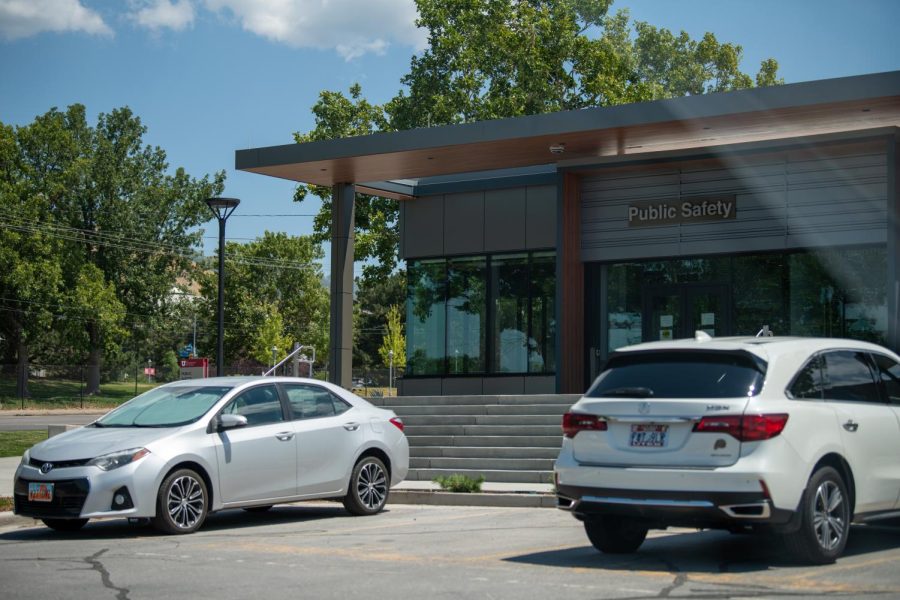New Deputy Chief Safety Officer Leads UUPD with Past Tragedies in Mind
The University pf Utah’s police department office in Salt Lake City, Utah on June 29, 2022. (Photo by Jonathan Wang | The Daily Utah Chronicle)
April 22, 2023
When Scott Carver, Deputy Chief Safety Officer for police services, was asked what drew him to work at the University of Utah, he answered almost immediately: “Lauren McCluskey.”
The legacy of McCluskey, who was murdered on the U’s campus in 2018, still looms large at the university. This is particularly true in the Department of Public Safety, as McCluskey sought help from U police on multiple occasions prior to her tragedy.
“I was the undersheriff in Salt Lake County and was just appalled by what had occurred,” Carver said. “The lack of response on the part of the officers that were dealing with her case, the total mishandling of that, and I wanted to be a part of the change and part of fixing those problems.”
The creation of Carver’s position is part of a restructuring of the department headed by Chief Safety Officer Keith Squires. A new DPS office building that cost $14.5 million was unveiled last November.
“Upon his appointment, CSO Squires restructured DPS, eliminating five of seven director positions and creating two deputy CSO positions,” said Rebecca Walsh, communications director for the U in an email interview. “This streamlining of the department reduces silos, improves coordination of resources, provides for better strategic planning and enhances department communication.”
Carver, who has nearly 50 years of law enforcement experience, started as Deputy CSO in February. He said when he started he realized how much work had been put into improving the department since 2018, but knew there was “still plenty of work to be done.”
He also said that although the DPS has been restructured in order to prevent a tragedy like McCluskey’s from reoccurring, he’s approaching his position with those past failings of the DPS in mind.
“Every project that I approach, every situation that I’m made aware of, the questions that I ask, are geared to making sure that those problems don’t continue to exist or resurface,” Carver said. “Because sometimes you can eliminate a problem, and if you’re not diligent about watching it, it can surface again somewhere.”
There was a nationwide search to fill the position that began in September, Walsh said. There were 34 initial applicants, but only four of them made it to the final round of interviews with CSO Squires, including Carver.
In his Deputy CSO position, Carver said he’s responsible for the police services part of the department, which includes any registered law enforcement officers working at the U.
“The position is important because you have to have a leader in these positions so that you can communicate directives down and get the feedback back up,” he said.
According to Walsh, Carver and Deputy Director of support services, Kimberly Barnett, also work closely with Squires on a daily basis to “ensure that the Department of Public Safety is responsive to all requests for assistance, investigative cases and operational services.”
In addition to preventing old problems from resurfacing, Carver said he’s committed to finding and improving current issues when it comes to campus safety.
“Because we are constantly interested in feedback and dialogue with the students, faculty, staff, we rely heavily on them telling us where those concerns are,” he said.
He added that although he and his team have their own efforts to find those problem areas, it’s much more efficient and effective when they follow feedback from members of the campus community.
“We are a customer service,” Carver said. “We could go down a path of some sort of project or change and totally miss the mark, have no effect on campus safety feelings … That feedback gives us the path to follow.”
This feedback comes in many different forms, Carver said, and he invited students to send him an email if they had any questions, comments or concerns for him.
Though he’s been in law enforcement for a long time, in many different roles, Carver said his motivation has always remained the same: “to help people.”
Moving forward, Carver aims to continue to refine the processes that were implemented by CSO Squires and the DPS before he arrived.
“Chief Squires and Interim Chief [Jason] Hinojosa, and the others that were here, implemented the changes and now we are fine-tuning those,” Carver said. “As we come upon ways of doing things better, then we’ll discuss it and implement the ones that work.”








